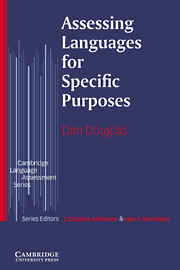Book contents
- Frontmatter
- Contents
- Series editors' preface
- Acknowledgements
- 1 Why test language for specific purposes?
- 2 Specific purpose language ability
- 3 Context, discourse domains, and task characteristics
- 4 Strategic competence: between knowledge and context
- 5 From target language use to test tasks
- 6 Specific purpose tests of listening and speaking
- 7 Specific purpose tests of reading and writing
- 8 LSP test development and technology
- Appendix: other LSP tests
- References
- Index
8 - LSP test development and technology
Published online by Cambridge University Press: 03 May 2010
- Frontmatter
- Contents
- Series editors' preface
- Acknowledgements
- 1 Why test language for specific purposes?
- 2 Specific purpose language ability
- 3 Context, discourse domains, and task characteristics
- 4 Strategic competence: between knowledge and context
- 5 From target language use to test tasks
- 6 Specific purpose tests of listening and speaking
- 7 Specific purpose tests of reading and writing
- 8 LSP test development and technology
- Appendix: other LSP tests
- References
- Index
Summary
Introduction
In Chapter 5 I discussed the problem of moving from an empirical analysis of the field specific target language use situation to test task specification. In Chapters 6 and 7 we looked at a number of existing field specific tests and considered the processes by which they were developed. In this concluding chapter I will discuss further crucial aspects of field specific test development, namely operationalization, piloting, revising, and validation. I discuss these important facets of test development in this chapter rather than in Chapter 5, because they deal with the whole test as opposed to individual tasks, which was the focus of earlier discussions of test development.
Operationalization refers to the application of the qualities of good testing practice discussed in Chapter 5 – validity, reliability, authenticity, impact, and practicality – to inform our decisions about precisely how the characteristics of the TLU situation can be converted into test tasks. For example, not all TLU tasks will be appropriate to the testing situation because they may not provide us with useful information about the language abilities we wish to measure, or they may require specialized information that not all the test candidates can be expected to have. In such cases, the tasks will need to be modified for use in the test.
Information
- Type
- Chapter
- Information
- Assessing Languages for Specific Purposes , pp. 246 - 282Publisher: Cambridge University PressPrint publication year: 1999
